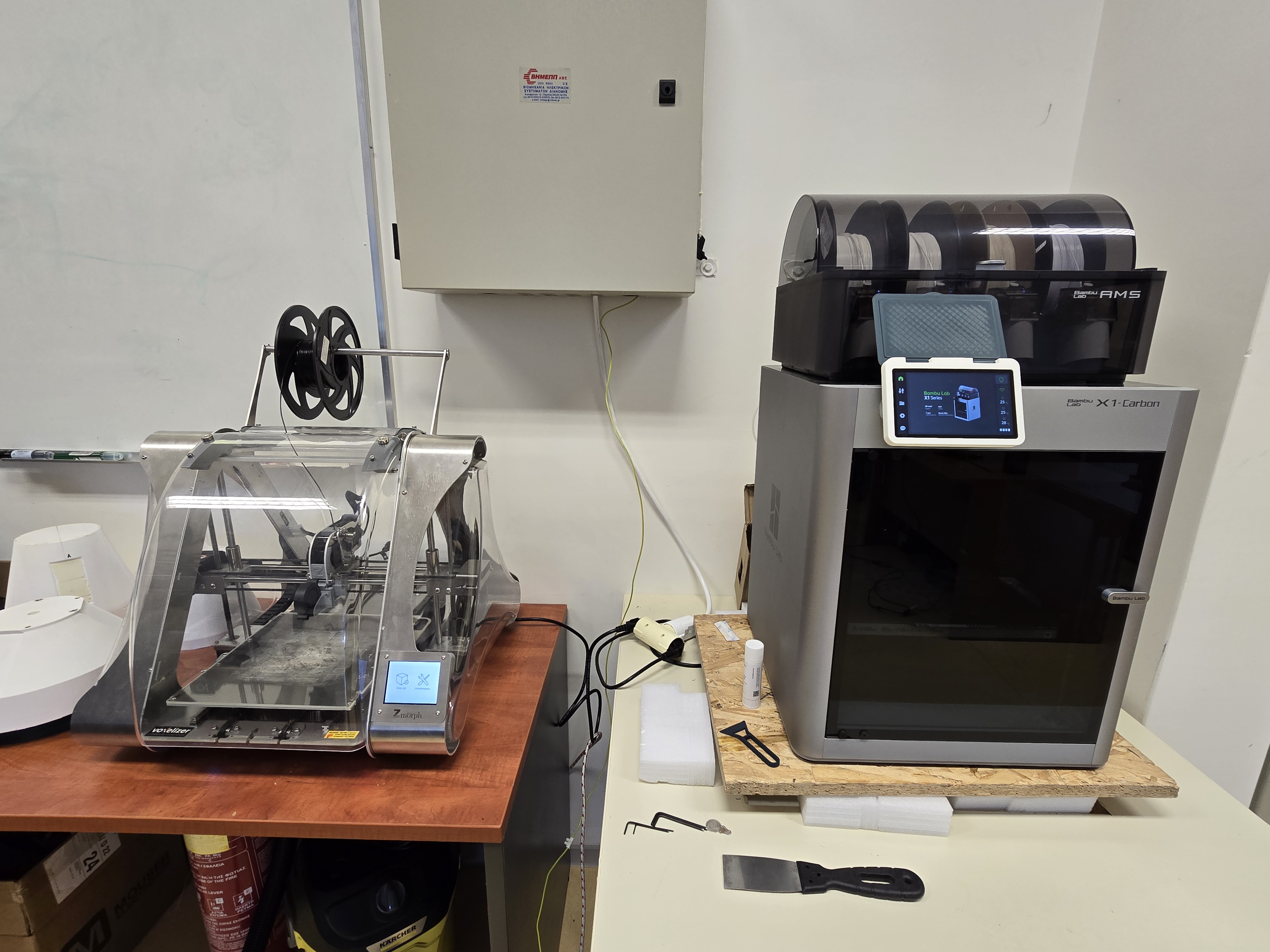Main Infrastructure
The laboratory has state-of-the-art equipment for the design, development and certification of advanced embedded systems, consisting among others of:







The Autonomous Systems Laboratory provides an integrated environment for research, development and testing across the entire lifecycle of autonomous systems. The dedicated workspace facilitates the design, assembly and evaluation of microelectronic circuits through a complete solder/desolder station and a high-powered microscope for precise handling and inspection. In-depth characterization of the developed systems is achieved with a range of electronic test equipment, including precision multimeters, oscilloscopes, electronic loads and power supplies for comprehensive electrical analysis. In addition, a logic analyzer facilitates the decoding and analysis of digital signals.
Rapid design iteration is driven by a state-of-the-art 3D printer and “multi-tool” manufacturing engine, enabling the creation of specialized tools and physical structures to support autonomous system development. The lab has a number of development platforms that power the creation of Internet-of-Things (IoT) applications, machine vision systems, video processing and Field-Programmable Gate Array (FPGA) systems.
High-performance computing capabilities are provided by a powerful virtual cluster featuring 32 CPUs and 192 GB of RAM. This computational capability facilitates complex simulations, data analysis, and machine learning tasks related to autonomous system development and performance evaluation.
The workshop also focuses on advancing the capabilities and effectiveness of unmanned aerial vehicles (UAVs) and drones. Using a scientific approach, researchers are incorporating machine vision and video processing techniques to improve the navigation, obstacle avoidance and object recognition capabilities of these autonomous systems.
In addition, machine learning methodologies are applied to analyze massive amounts of sensor data collected during flight operations, helping to improve flight algorithms and decision-making processes. Through rigorous experimentation and analysis, the laboratory aims to contribute to the continuous improvement of the performance and autonomy of UAVs, promoting their utility in various fields such as surveillance, tracking and disaster response.
The laboratory deals with research and applications related to the academic subjects:
as they are all components of ambient intelligence and the Internet of Things (IoT).
The laboratory has state-of-the-art equipment for the design, development and certification of advanced embedded systems, consisting among others of:
KEYSIGHT 16862A 68-Channel Portable Logic Analyzer
KEYSIGHT 34465A, HEWLETT PACKARD 34401A, 3 x KEITHLEY 2110 5 1/2 DIGIT MULTIMETER, B&K PRECISION 8601, KEYSIGHT E3632A, RIGOL DP832A.
KEYSIGHT InfiniiVision MSOX3024T, RIGOL DS1074Z PLUS
WR 2000A, WT 1014.
ZMorph VX.


The members of the laboratory are engaged in a wide range of research and development activities, including:
The members of the laboratory teach the following courses:
Στα πλαίσια των ερευνητικών δραστηριοτήτων του εργαστηρίου προτείνονται οι παρακάτω πτυχιακές εργασίες:
Thesis Summary
Μελέτη ενεργειακού ισοζυγίου για την τροφοδοσία ασύρματων κόμβων από θερμότητα και κραδασμούς.
Thesis Requirements / Required Knowhow
Γνώσεις προγραμματισμού, Γνώσεις Ηλεκτρονικών.
Supervisor
Γρηγόριος Δουμένης (greg@uoi.gr)
Thesis Summary
Ανάπτυξη και υλοποίηση συστήματος αναγνώρισης video μέσω της εξαγωγής ψηφιακών υπογραφών.
Thesis Requirements / Required Knowhow
Γνώσεις προγραμματισμού και επεξεργασίας video.
Supervisor
Γρηγόριος Δουμένης (greg@uoi.gr)
Thesis Summary
Δημιουργία ασύρματου κόμβου για την απομακρυνσμένη διαχείρισης μονάδας A/C χρησιμοποιώντας την πλατφόρμα διαχείρισης και περιβαλλοντολογικού ελέγχου του κτηρίου του τμήματος.
Thesis Requirements / Required Knowhow
ESP32, C, Γνώσεις προγραμματισμού, Γνώσεις Ηλεκτρονικών.
Supervisor
Γρηγόριος Δουμένης (greg@uoi.gr)
Thesis Summary
Ανάπτυξη και κατασκευή κουτιού ειδικών προδιαγραφών για τα ηλεκτρονικά μέρη ενός ασύρματου αισθητήρα πεδίου και κατασκευή με 3D printing.
Thesis Requirements / Required Knowhow
CAD, Γνώσεις Ηλεκτρονικών.
Supervisor
Γρηγόριος Δουμένης (greg@uoi.gr)
Thesis Summary
Μέτρηση και αξιολόγηση επιδόσεων φωτοβολταικών και θερμοηλετρικών στοιχείων για τροφοδοσία αυτόνομων ενσωματωμένων συστημάτων.
Thesis Requirements / Required Knowhow
Γνώσεις Ηλεκτρονικών, Arduino.
Supervisor
Γρηγόριος Δουμένης (greg@uoi.gr)
The above mentioned courses are part of the carriculum of the Department of Informatics & Telecommunications of University of Ioannina.

Assistant Professor

Assistant Professor

Postgraduate Student

PhD Candidate

PhD Candidate

Undergraduate Student

PhD Candidate

Phd Candidate
Το Εργαστήριο Αυτόνομων Συστημάτων στο διεθνές Συνέδριο SEEDA-CECNSM 2022. Το συνέδριο θα είναι υβριδικό, επιτρέποντας φυσική και διαδικτυακή συμμετοχή.
Continue readingΤο Εργαστήριο Αυτόνομων Συστημάτων σας καλεί στο workshop με θέμα "Αυτο-τροφοδοτούμενα συστήματα στο διαδίκτυα των αντικειμένων".
Continue readingNaskari, V.; Doumenis, G.; Masklavanos, Information 2023, 14, 316., doi.org 10.3390 info14060316
G. Doumenis, V. Naskari, E.V. Hristoforou, P. Pattakos, G. Stamou, C. Papakis and I. Masklavanos, Edge Intelligence 2023, Emerging Tech Conference (ETCEI 2023), Thessaloniki, Greece (2023)
I. Masklavanos, V. Naskari, C. Koutsos, F. Vartziotis, G. Doumenis, S. Siskos, A. Bardakas, A. Segkos, C. Tsamis, C. Papakis and G. Koukas, Edge Intelligence 2023, Emerging Tech Conference (ETCEI 2023), Thessaloniki, Greece (2023)
Masklavanos Ioannis, Koutsos Christos, Doumenis Gregory, 7th South-East Europe Design, Computer Engineering, Computer Networks and Social Media Conference (SEEDA-CECNSM), 2022
Naskari Vasiliki, Doumenis Gregory, Koutsos Christos, Masklavanos Ioannis, 7th South-East Europe Design, Computer Engineering, Computer Networks and Social Media Conference (SEEDA-CECNSM), 2022
G. Doumenis, I. Masklavanos and K. Tsiapali, 2022 7th South-East Europe Design Automation, Computer Engineering, Computer Networks and Social Media Conference (SEEDA-CECNSM), 2022, pp. 1-7, doi: 10.1109, SEEDA-CECNSM57760.2022.9932933
K. Tsiapali, S. Katsikas, A. Sakellariou. G. Doumenis and I. Masklavanos, Edge Intelligence 2022, Emerging Tech Conference
Fotios Vartziotis, European Test Symposium (ETS), 2021
V. Naskari, G. Doumenis, C. Koutsos and I. Masklavanos, 2022 7th South-East Europe Design Automation, Computer Engineering, Computer Networks and Social Media Conference (SEEDA-CECNSM), 2022, pp. 1-6, doi: 10.1109, SEEDA-CECNSM57760.2022.9932899.
I. Masklavanos, C. Koutsos and G. Doumenis, 2022 7th South-East Europe Design Automation, Computer Engineering, Computer Networks and Social Media Conference (SEEDA-CECNSM), 2022, pp. 1-6, doi: 10.1109, SEEDA-CECNSM57760.2022.9932904.
Dept. of Informatics & Telecommunications, Kostaki - Arta, GR47 100
asl@uoi.gr
+30 26810 50335